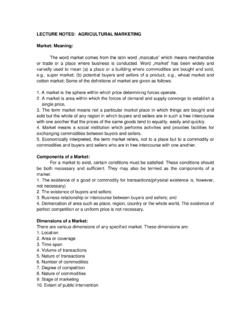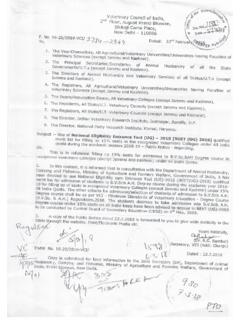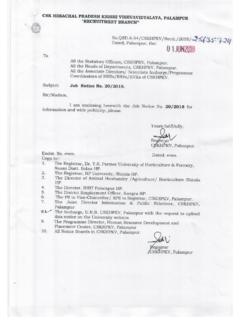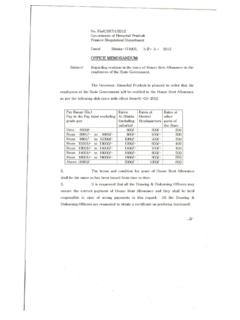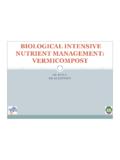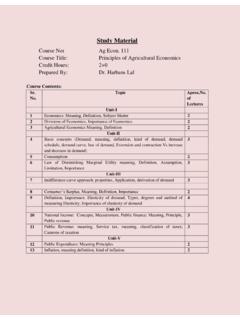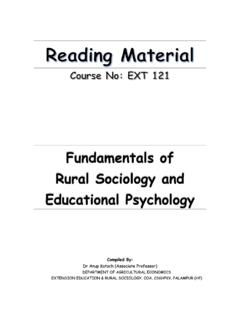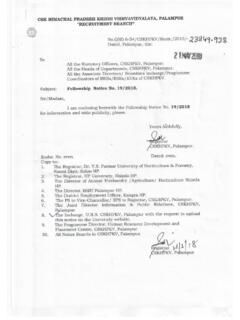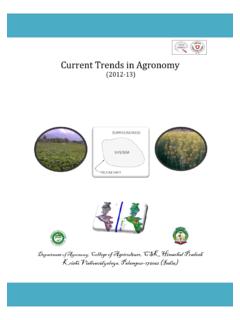Transcription of Fundamentals of Rural Sociology and Educational Psychology
1 Fundamentals of Rural Sociology and Educational Psychology Compiled By: Dr Anup Katoch (Associate Professor) DEPARTMENT OF AGRICULTURAL ECONOMICS EXTENSION EDUCATION & Rural Sociology , COA, CSKHPKV, PALAMPUR (HP) Table of Topic Page No 1. Meaning and definition of Sociology and Rural Sociology . 2. Scope of Sociology and Rural Sociology 3. Importance of Rural Sociology in agricultural extension & interrelationship with agricultural extension 4. Indian Rural society and its important characteristics 5. differences and relationship between Rural and urban societies 6. Social Groups - meaning and definition, classification of groups 7. Factors considered in formation and organisation of groups, motivation in group formation, role of social groups in agricultural extension 8. Meaning, definition & functions of social stratification 9. Basis for stratification, forms of stratification 10.
2 Difference between class and caste system 11. Meaning and definition of cultural concepts (Culture, Customs, Folkways, Mores, Taboos, Rituals and Traditions) 12. Role of cultural concepts in agricultural extension 13. Meaning and definition of social values and attitudes 14. Types and role of social values and attitudes in agricultural extension 15. Meaning and definition of social institutions 16. Major institutions in Rural society, functions and their role in agricultural extension 17. Meaning, definition and types of social organization 18. Role of social organizations in agricultural extension 19. Meaning, definition and need of social control 20. Means of social control 21. Meaning, definition and nature of social change 22. Dimensions & factors of social change 23. Psychology and Educational Psychology meaning and definition 24. Scope and importance of Educational Psychology in agricultural extension 25.
3 Intelligence meaning , definition, types 26. Factors affecting intelligence and importance of intelligence in agricultural extension 27. Personality meaning, definition and types 28. Factors influencing the personality and role of personality in agricultural extension 29. Extension teaching meaning, definition and steps 30. Learning and learning experience - meaning and definition 31. Learning situation - meaning, definition, elements and characteristics 32. Principles of learning and their implication for extension teaching Reference Books 1. Chitamber, JB (1990) Introduction to Rural Sociology . Wiley Eastern Pvt. Ltd, New Delhi. 2. Dahama OP and Bhatnagar, OP (1987) Education and Communication for Development. Oxford and IBH Publishing Co. Pvt. Ltd, New Delhi 3. Daivadeenam, Pujari (2002) Educational Psychology in Agriculture.
4 Agrotech Publishing Academy, Udaipur. 4. Desai, AR (1978) Rural Sociology in India. Popular Prakashan, Bombay. 5. Ray, GL (2003) Extension Communication and Management. Kalyani Publishers. New Delhi. 6. Sharan, AK (1999) Social Psychology . Commonwealth Publishers. New Delhi Sociology : The science of society August Comte the French philosopher, commonly regarded the father of Sociology , used the term Sociology in 1839, for a body of knowledge, concerned with social behaviour and social institutions. August Comte named the field of study from two words, Latin word Socious means society and Greek word logos means study or science. So etymological meaning of Sociology is the science or study of society, that is, the web of human interactions and interrelationships. Sociology is the youngest of all social sciences. It joined the family of social sciences when it was recognized that the other social sciences failed to fully explain man s social behaviour.
5 Nevertheless, Sociology to some extent has following characteristics of science. 1. It is empirical; that is, it is based on reasoning and observation, not on supernatural revelation, and its results are not speculative. 2. It is theoretical; that is, it attempts to summarize complex observation in abstract, logically related propositions which purport to explain causal relationships in the subject matter. 3. It is cumulative; that is, sociological theories build upon one another, new theories, correcting, extending and refining the older ones. 4. It is non-ethical; that is, sociologists do not ask whether particular social actions are good or bad; they seek merely to explain them. Definition of Sociology Sociology is the science of society. However, it has been defined in different ways by different sociologists. Max Weber defined Sociology as a science which interprets social behaviour with the aim of arriving at causal explanation of human behaviour.
6 Hobhouse maintained that Sociology is comprehensive science of society which aimed at the interpretation of social life. Morris Ginsberg defined Sociology as the study of the conditions and consequences of human interactions and interrelations. All the definitions of Sociology emphasize on the point that Sociology is the study of social relationships. A brief definition of Sociology is that it is a social science which makes a scientific study of men s relationships in the society. Misconceptions about Sociology Because of several misconceptions about Sociology , it is useful to describe what it is not, thereby dispelling misconceptions and clarifying the major concerns of the field of Sociology . Sociology is a science, not a social philosophy A social philosophy is a system of ideas and values that tell people how to behave and lays down procedures, norms, and rules of behaviour according to which people are expected to act.
7 Sociology studies how people behave without trying to influence how they should behave. It studies what is, not what should be. Social philosophies may be many such as Buddhism, Hinduism, sikhism or christianity . Sociology is a science not a design for loving. Sociology is a science, not socialism Even though the words are similar, they are not connected one with another. One is science interested in studying human behaviour but the other is political and economic movement. Sociology is science, not social reform or social welfare Sociology is knowledge not a direct treatment. It seeks knowledge about people and their behaviour. Sociologists and Rural sociologists may serve as consultants for Rural community development and social reform or welfare programmes, but they do no more than present facts, analyze social situations and give advice for action that may serve to facilitate achievement of objects.
8 Sociology is not a social science; it is one of the social sciences Sociology is youngest of all social sciences and has several specializations such as Rural Sociology , Industrial Sociology , and Political Sociology etc. In addition to Sociology other social sciences are Political Science, Economics and Social Psychology . All these social sciences study man in various aspects of his life. Rural Sociology Rural Sociology is a specialized field of Sociology . It is the study of life in Rural environment, which systematically studies Rural communities to discover their conditions and tendencies to formulate the principles of progress. It is limited to various aspects of Rural society in the study of Rural social relationships. Definition of Rural Sociology According to F. Sturat the Sociology of Rural life is a study of Rural population, Rural social organization and the social processes operative in Rural society.
9 According to Desai (1978), Rural Sociology is the science of Rural society. So, it is clear that Rural Sociology is related to the organized and scientific study of the life of Rural people and their personal inter-relationships. IMPORTANCE OF Rural Sociology IN AGRICULTURAL EXTENSION The knowledge of Rural Sociology is very important in agricultural extension for the following reasons: The basic purpose of agricultural extension is changing the behaviour of farmers as desired. Therefore, knowledge and understanding of Rural people (farmers) is essential. It is the Rural Sociology which provides this knowledge and understanding about the farmer vis- -vis Rural social system in which he lives. It helps in devising an agricultural extension plans for farmers. It helps in identifying the groups, individuals, organisations and leaders. Besides this, the interrelationship between agricultural extension and Rural Sociology also highlights the importance or Rural Sociology in agricultural extension.
10 The Internationalship between Sociology and Agricultural Extension Agricultural extension and Rural Sociology are extremely close to each other. Both fields are greatly concerned with the study of Rural life. However, following are the major points which clearly indicate the relationship. Rural Sociology is the scientific study of Rural man s behaviour in relationship to other groups and individuals with whom he interacts. Agricultural extension is a non-formal education for farmers ( Rural people) with a view to develop Rural society on desirable lines. Rural Sociology studies the attitude and behaviour of Rural people whereas agricultural extension seeks to modify or change the attitude and behaviour of farmers. Rural Sociology studies the needs and interests of Rural society and agricultural extension helps farmers to discover their needs and problems and build Educational programmes based on these needs and wants.
